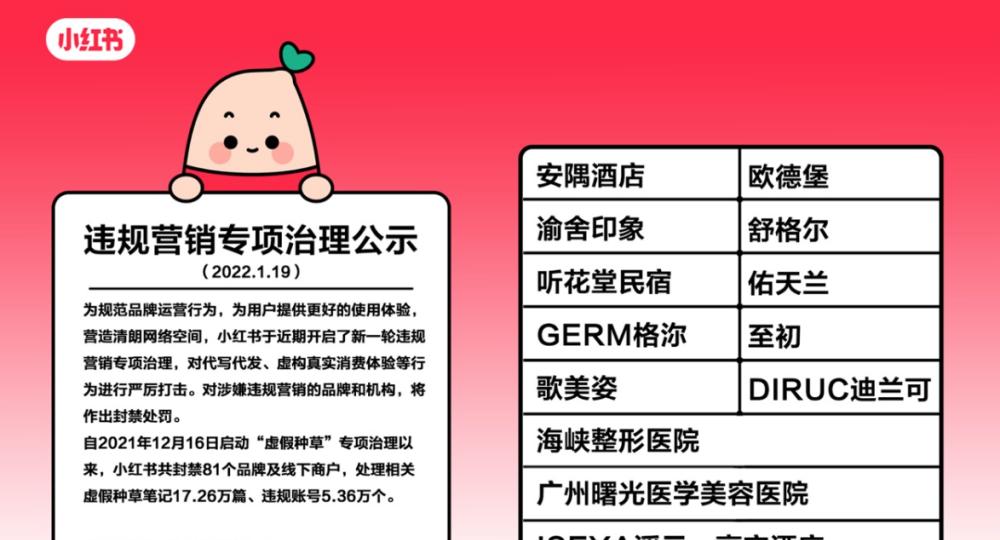On January 19, Xiaohongshu announced that it had officially filed a lawsuit against four notification platforms and MCN institutions such as MicroMedia Notice, Chengbao, and Nanjing Mussel, which engaged in the business of "ghostwriting and sending" false grass notes, helping merchants and bloggers to carry out false promotion, causing great harm to the platform content ecology and platform reputation, and seriously damaging the legitimate rights and interests of users.
To this end, Xiaohongshu requires the above-mentioned institutions to immediately stop the false promotion and trading of Xiaohongshu and compensate Xiaohongshu for economic losses of 10 million yuan, and the compensation will be used for the platform's false grass management.
At the same time, in response to the special action of "Qinglang • Crackdown on Traffic Fraud, Black Public Relations, and Network Water Army", Xiaohongshu launched the third round of false grass planting governance, and after the first two batches of banning 68 fake grass brands and offline merchants, Xiaohongshu once again banned 6 offline merchants including Yushe Impression, Anyu Hotel, Guangzhou Shuguang Beauty Hospital, etc., as well as 7 brands including Youtianlan, Zhichu, Oudebao, etc.

Since the launch of the special governance of "false grass planting" on December 16, 2021, Xiaohongshu has banned 81 brands and offline merchants, handled 172,600 related false grass planting notes, and 53,600 illegal accounts.
In this regard, the person in charge of the Xiaohongshu "false marketing" governance project said: "Only governing the false content and accounts in the platform, the symptoms are not cured, so it is necessary to cut off the demand of the upstream brand 'ghostwriting and sending' in order to fundamentally crack down on this gray production chain." The reporter learned that many brands use product/service replacement or cash to find a large number of ordinary people through external intermediaries or platforms, and lay illegal marketing content on various platforms.
Xue Jun, professor of law at Peking University and director of the E-commerce Law Research Center of Peking University, said that the industrial chain of online black and gray production has three main links, which are closely linked and divide labor with each other: first of all, the demand side, hoping to use black and gray production to brush orders to achieve traffic fraud. The second is a third-party agency that undertakes demand, such as a single company. Finally, there were a large number of dispersed participants who received tasks like "Brush Order" and "Brush Praise".
According to media reports, the black and gray production link of "ghostwriting and sending" is usually: the brand or a third-party intermediary agency that undertakes the needs of the brand party, through the third-party order-taking intermediary platform represented by the "Red Notice", "Micro Media Notice", "Tomato Notice", etc., with physical goods/services or cash ranging from 0-1000 yuan, a large number of paid recruits to produce content on Xiaohongshu, Douyin, Weibo, and Dianping.
Open the "Tomato Notice" Mini Program, you can see that the notice platform has a large number of brands recruiting people to share information, brands use physical goods, or with cash ranging from 0 yuan to 500 yuan, as a reward for ordinary people to share content on Platforms such as Xiaohongshu, Douyin, Weibo and so on.
In the recruitment information, the brand will clearly mark the requirements for docking the fans and data of the solips, and the vegetarians need to feedback the screenshots they share on each platform to the brand side after receiving the order, in order to get the goods or cash remuneration.
These institutions that recruit ordinary people on the notice platform are generally brand parties, or MCN agencies represented by Chengbao and Nanjing Mussels for the marketing needs of agent brands.
Xue Jun said that businesses that entrust others to carry out false planting of grass are acts of unfair competition that engage in false propaganda, while for organizers and companies operating on behalf of others, it is both an act of unfair competition that helps others to carry out false propaganda and an illegal business activity. "In the future, we can further promote the legislative regulations in this area and specificize the corresponding crimes."
Xue Jun believes that governance needs to clarify the ecological chain, industrial chain and interest chain in order to truly effectively crack down. If only one of the segments is focused, the upstream and downstream problems are not solved, and the problem is difficult to effectively cure. At the same time, Xue Jun believes that problems such as illegal marketing need to be linked by the industry, and each platform jointly cracks down on and governs the operating platforms and intermediary agencies of black and ash production.
"The governance of illegal marketing, we will definitely insist on doing it for a long time." It is a protracted battle with many governance difficulties that cannot be completely overcome through a single platform. Shen Lian, editor-in-chief of Xiaohongshu, said, "For example, similar to the micro-media notice, red notice and other third-party order intermediary platforms, we still haven't found a particularly good way to combat them today, but we will continue to try and find a way." ”
Image source: Little Red Book